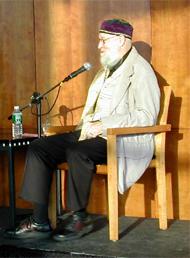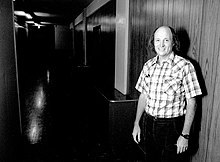Terry Riley
Terry Riley (born June 24, 1935 in Colfax , California ) is an American composer and pianist . With his “micropolyphonic” structures, adapted from Asian and African trance music, he contributed to the “invention” of minimal music and is one of its most popular representatives. In the mid-1960s, he introduced the compositional technique of pattern music based on rhythmic models into minimal music .
Live and act
Riley has performed as a pianist and improviser since the mid-1950s. He studied music at Shasta College , San Francisco State University and the San Francisco Conservatory before completing his master's degree in composition at the University of California, Berkeley with Seymour Shifrin and Robert Erickson in 1961 . He was involved in the operations of the San Francisco Tape Music Center , where he came into contact with Morton Subotnick , Steve Reich , Pauline Oliveros and Ramon Sender . He also studied Indian singing with Pran Nath ; He made several trips to India, where he learned to accompany on the tabla and the tanpura . Since 1971 he has taught Indian classical music at Mills College for many years .
In the early 1960s he first played solo organ appearances that lasted all night until sunrise. He was one of the first composers to work in 1963, during the recording for Music for the Gift in Paris, with loops and time delays based on an arrangement developed by an unknown sound engineer who worked for Riley. Terry Riley called this forerunner of later echo devices the Time Lag Accumulator . A similar arrangement by Robert Fripp later became known under the name Frippertronics . These are two Revox tape machines, in which the spatial distance between the machines determines the length of the tape loop and thus the time delay.
His work includes compositions for chamber ensembles, for large formations and for ensembles of rock music and improvised music . Many different versions of his work In C , which premiered in San Francisco in 1964, were recorded on sound carriers. Riley also wrote film scores , for example for Sandy Whitelaw's thriller Life Span or Alain Tanner's feature film No Man's Land (1985).
As a renowned pianist, singer and improviser, Riley has also appeared as a solo artist around the world. In the course of his career he also worked with a wide variety of artists such as La Monte Young , Don Cherry / Karl Berger ( Live in Cologne February 23, 1975 ), John Cale ( Church of Anthrax ), Krishna Bhatt , Stefano Scodanibbio and Bruce Conner . Riley has received many awards, e.g. B. for his works for the Kronos Quartet , for which he wrote 15 works, including thirteen string quartets and The Sands , a concerto for string quartet and orchestra.
A Rainbow in Curved Air inspired Pete Townshend from the band The Who to his synthesizer introductions on the songs Won't Get Fooled Again and Baba O'Riley , the title being a tribute to Riley and Meher Baba . In addition, the band named Curved Air after the composition.
Riley received an honorary doctorate from Chapman University in 2007 . In 2020 he was elected to the American Academy of Arts and Letters .
Discography (selection)
- In C (numerous recordings)
- A Rainbow in Curved Air / Poppy Nogood and the Phantom band (CBS)
- Church of Anthrax with John Cale ( Columbia )
- No Man's Land ( Plainisphare )
- The Persian Surgery Dervishes (Shandar)
- Shri Camel (CBS)
- Descending Moonshine Dervishes (Kukuck)
- The Harp of New Albion (Celestial Harmonies) (in pure tuning )
- Salome Dances for Peace - Kronos Quartet ( Nonesuch Records )
- Chanting the Light of Foresight - Rova Saxophone Quartet (New Albion) (in pure tuning )
- Assassin Reveries - ARTE Quartet (New World Records)
- Looking for mushrooms
- Music for The Gift (Cortical Foundation)
- Autodreamographical Tales ( Tzadik 2010)
- Aleph (Tzadik 2010)
literature
- Robert Carl Terry Riley's in C . Oxford University Press, 2009 ISBN 978-0-19-532528-7
- Ulli Götte: Minimal Music - History, Aesthetics, Environment Wilhelmshaven: Florian Noetzel-Verlag 2002. ISBN 978-3795907778
- Keith Potter Four Musical Minimalists: La Monte Young, Terry Riley, Steve Reich, Philip Glass. Music in the Twentieth Century series . Cambridge, UK; New York, New York: Cambridge University Press 2000
- Christoph Wagner Discipline and ecstasy: Terry Riley or minimal music as a counterculture. Neue Zeitschrift für Musik 161 (5) (2000): 16-19.
Web links
- Terry Riley's website
- Biography on musicline.de
- Sheet music and audio files by Terry Riley in the International Music Score Library Project (The works are under a Creative Commons license.)
- Terry Riley at Allmusic (English)
- Terry Riley at Discogs (English)
Individual evidence
- ^ Dorling Kindersley Verlag: Compact & Visuell Classical Music . Munich, ISBN 978-3-8310-3136-8 , pp. 444 .
- ^ David W. Bernstein The San Francisco Tape Music Center: 1960s Counterculture and the Avant-garde University of California Press 2008
- ↑ loopers delight
- ^ Baumgärtel, Tilman: grinding. On the history and aesthetics of the loop . Kulturverlag Kadmos, Berlin 2015, ISBN 978-3-86599-271-0 , p. 225-250 .
- ↑ 2020 newly elected members. American Academy of Arts and Letters, accessed March 6, 2020 .
| personal data | |
|---|---|
| SURNAME | Riley, Terry |
| BRIEF DESCRIPTION | American composer and pianist |
| DATE OF BIRTH | June 24, 1935 |
| PLACE OF BIRTH | Colfax , California |

